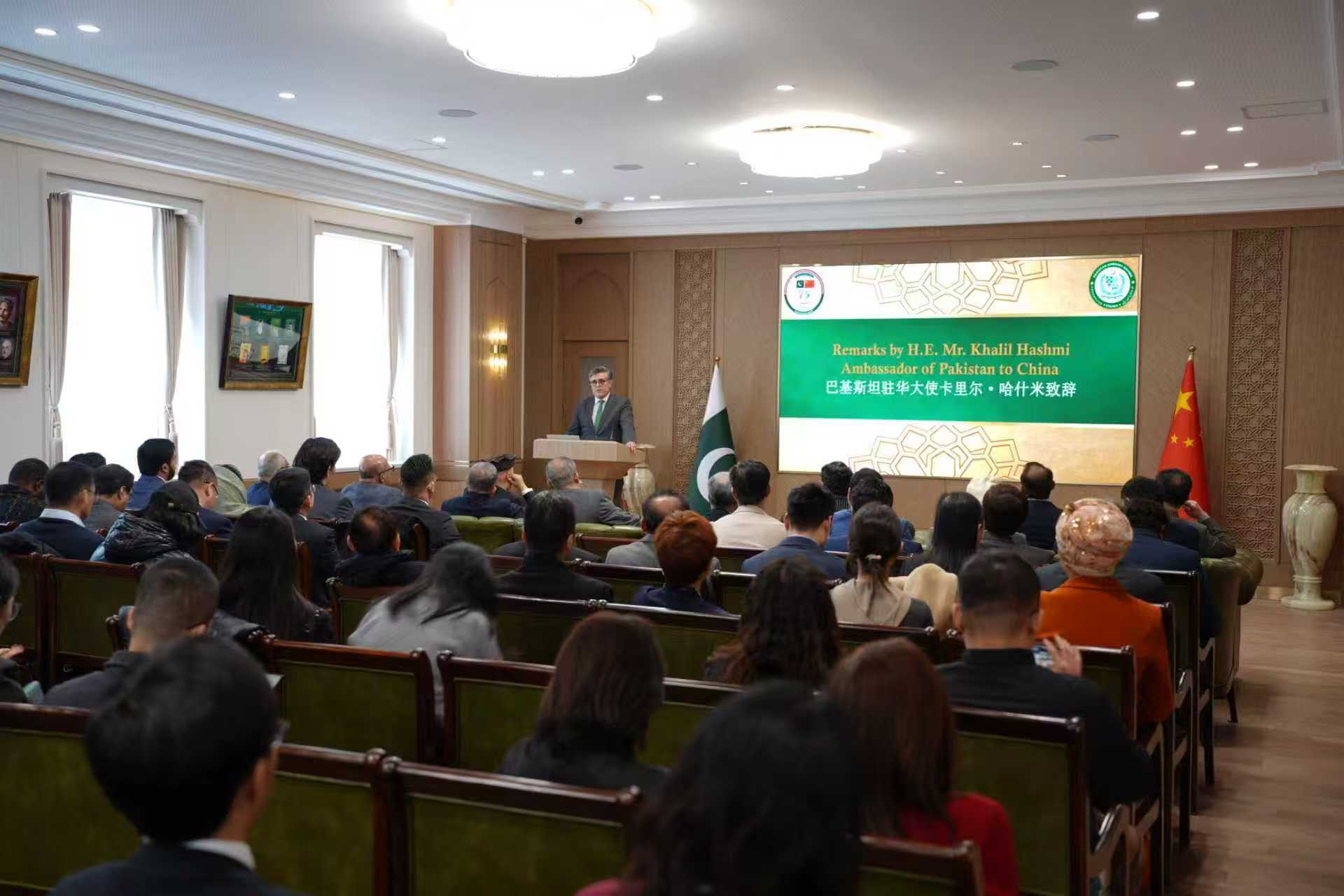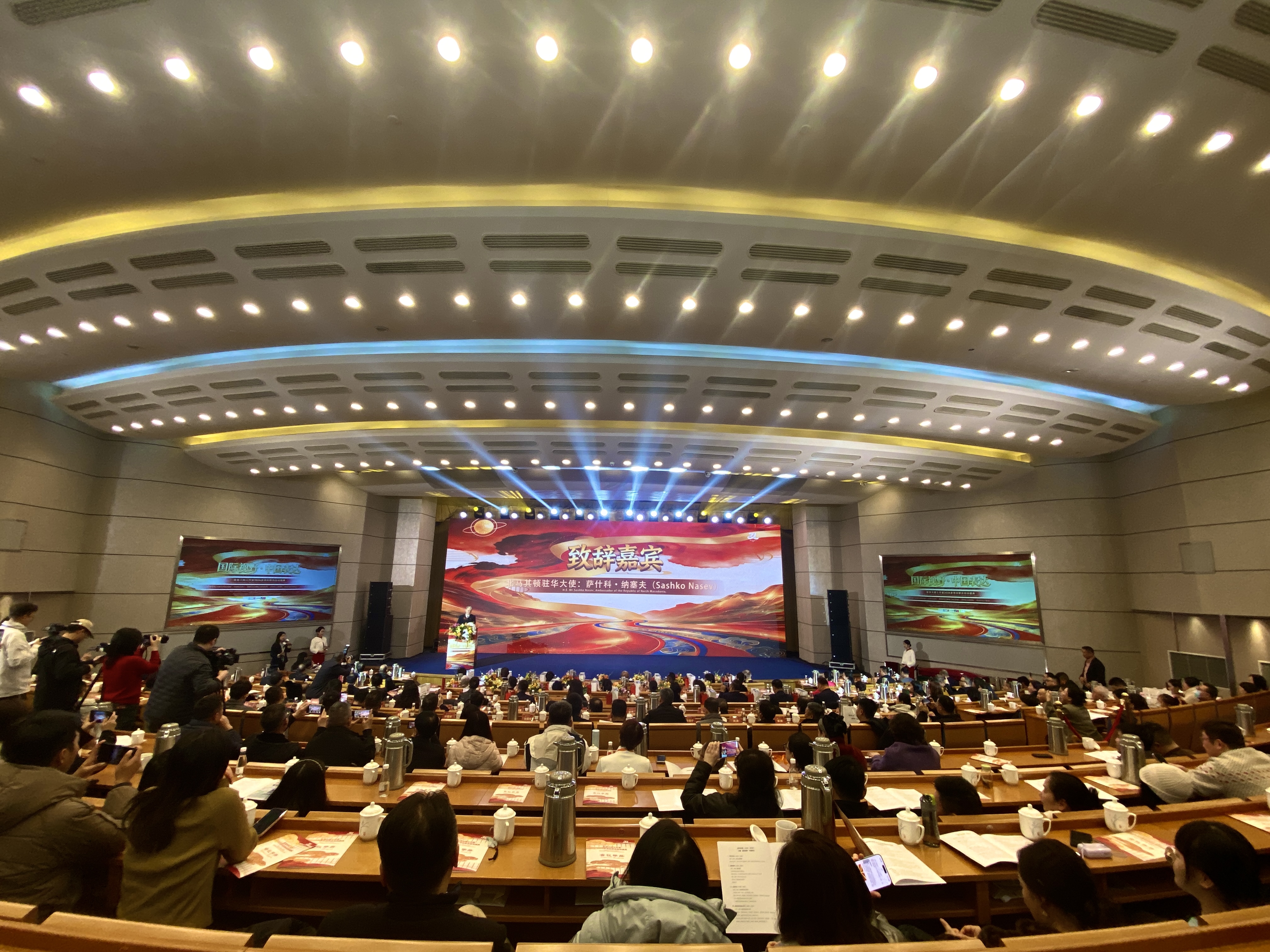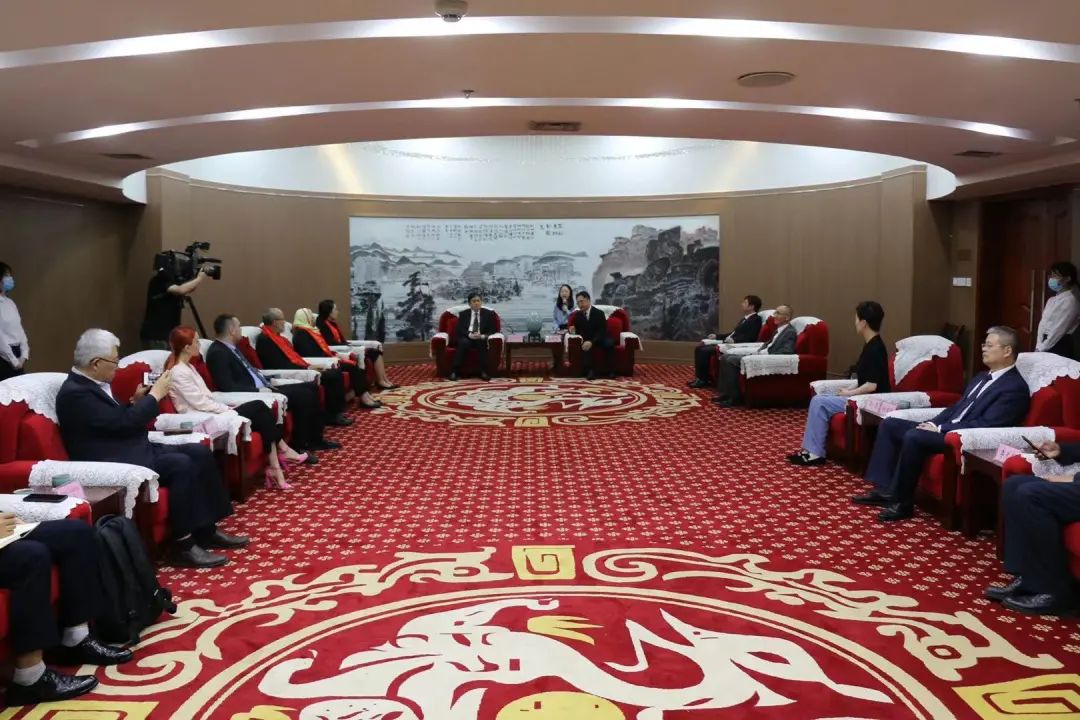The Pandemic Distracts From Wider Geopolitical Events
来源:
作者:James O’Neill* 点击:
发布时间:2020-06-10 12:39:32
Some recent events have captured the attention of the mainstream media to such an extent that other events of arguably greater importance have not received the attention they deserve. The events getting extraordinary prominence are the riots in the United States and the coronavirus outbreaks. Neither will be given more than a brief discussion because at the same time there are other events occurring of arguably greater importance that have received little or no attention, and such attention they did receive was inaccurately reported.
The first of these mainstream events, the worldwide pandemic generally referred to as the coronavirus is really notable for two main features. The first is that the actual toll of dead or disabled persons is a tiny fraction of the total populations of the countries affected. The United States for example, with the largest actual number of fatalities, currently just over 200,000, has lost 0.62% of its population. The annual influenza figures by comparison, according to the Centre for Disease Control, vary between nine and forty-five million, with deaths also varying widely, with 61,000 for example in 2017/18.
The pandemic has led however, to nearly 40,000,000 people being rendered unemployed, a phenomenon never seen in the annual influenza outbreaks. The real reasons for this extraordinary reaction remain unclear. Certainly Trump has used it as a weapon to beat the heads of the Chinese in his ongoing economic and political war against that country. The more evidence that emerges however, the more fragile that line of attack becomes.
It now seems highly more probable that the origin of the virus was the United States’ own Fort Dietrich research facility, closed in mid 2019 for unexplained reasons for several months. The first United States cases of the pandemic now appear to have occurred not far from that facility.
Trumps use of the pandemic as a stick to try and beat the Chinese with is better seen as another weapon in his ongoing political and economic war against China. His recent proposal to expand the invitees to the annual meeting of the G7 nations to include Russia (a member until 2014 when it was the G8) South Korea, Australia and India, was a thinly disguised manoeuvre against China.
If the G7 was indeed a collection of the worlds major economic powers, the exclusion of China, the worlds greatest economic power by a substantial margin, would make no sense. India rates number 5 of the world economic powers and its exclusion hitherto also makes no economic sense. Australia similarly is well down the world economic power list at number 14, but as a loyal acolyte of the United States, and indulging in political manoeuvres against China that are frankly economic suicide.
Those manoeuvres are explicable only in terms of its subservient role to the United States. That subservience has manifested itself in multiple ways over the past decades, but none of those ill-adventures threatened its economic well-being to the degree that joining Trump’s anti-China crusade is likely to.
It is significant that Germany’s Chancellor Merkel declined the invitation to attend the G7 meeting Trump was proposing for Washington in June. She cited the demands of the Covid virus battle in Germany, but that excuse fooled no-one.
Germany, along with several other European Union member states, sees China as having a bigger role in its economic future than the economically frail and declining (in relative terms) United States. It may be too much to hope for that after 75 years of US occupation Germany is finally asserting a political independence commensurate with its economic power. Germany, along with a number of European Union countries, clearly sees a better economic future for itself by having good relationships, economically and politically, with China and the eastern powers in general than with the United States.
To further emphasise the point, Merkel gave an address to the Konrad Adenauer Shiftung Institute on 27th May. In that speech she made it very clear that China would be a top priority for her government when Germany takes over the EU presidency in July this year.
In her speech Merkel further stressed that Germany plans greater cooperation with China. It hardly needs stressing that German plans for its politico-economic future lies to the East, and hardly wants or needs to be part of a United States led anti-China alliance.
Trumps political war against China will cause some economic damage, but it will not alter the broad path of China’s economic and political development. This year for example, the ASEAN nations became China’s largest trading group, replacing the European Union. Its rapidly growing economic and political relationship with Russia is a further incentive to decouple itself from the United States.
The United States also announced restrictions on the rights of Chinese students to study for advanced degrees in United States universities. The real pain of that move will be felt by the universities themselves. A similar phenomenon will occur in Australia. Although the Australian government has made no announcement restricting Chinese students (the largest foreign student group by a large margin) China’s ambassador to Australia has already made statements clearly hinting that in the light of anti-China sentiment expressed by the Australian government, Chinese students may well choose to study elsewhere. That mild suggestion, which invoked apoplexy among Australian university administrators, may be taken as more than a hint.
Similar restrictions on some Australian exports to China (which accounts for 36% of all Australian exports) may similarly be viewed as a strong hint that the Chinese have tired of Australia’s anti-China subservience to American wishes and, after ample hence suggesting that a modification of the rhetoric would not go astray, is now taking action. The message couldn’t be clearer: China has more alternatives than Australia and there is a price to pay for relentless anti-China rhetoric from government and mainstream media alike.
The Australian State of Victoria recently signed a memorandum of understanding with China over Victoria joining China’s huge Belt and Road Initiative. The Australian Federal government has, as expected, conformed to the United States’ anti-BRI rhetoric. It publicly expressed dismay at Victoria’s decision, joined by political commentators in the mainstream media, and editorials, sounding alarm and concern, literally sprinkled with outright falsehoods about the dangers such a move displayed. United States Secretary of State Pompeo even weighed in, offering dark threats about the jeopardy such a move posed to Australia’s accession to United States military secrets.
No such threats were made to the United States’ other five eyes alliance partner, New Zealand, when the latter signed up to the BRI in May 2019. It was typical Pompeo bluster. Not a single Australian commentator referred to the absence of retaliation against New Zealand, let alone raised the rather obvious question that perhaps Australia’s real national interests would be better served by not being tied to the United States. The American engineered coup d’état of November 1975 has insured that such heresy is not publicly urged by either politicians (of both major parties) or the media.
Schools and businesses will slowly return to normal after the pandemic subsides. The damage caused by the anti-China rhetoric will however, be greater in its effect and more long lasting in the damage it has caused. Germany has shown that there are viable alternatives to the American grasp, and together with many of its EU partners is making economic and political moves consistent with the changing realities of the 21st century geo- political and economic landscape. It is a lesson that others would be well advised to learn from.
· Barrister at law and geopolitical analyst.
The first of these mainstream events, the worldwide pandemic generally referred to as the coronavirus is really notable for two main features. The first is that the actual toll of dead or disabled persons is a tiny fraction of the total populations of the countries affected. The United States for example, with the largest actual number of fatalities, currently just over 200,000, has lost 0.62% of its population. The annual influenza figures by comparison, according to the Centre for Disease Control, vary between nine and forty-five million, with deaths also varying widely, with 61,000 for example in 2017/18.
The pandemic has led however, to nearly 40,000,000 people being rendered unemployed, a phenomenon never seen in the annual influenza outbreaks. The real reasons for this extraordinary reaction remain unclear. Certainly Trump has used it as a weapon to beat the heads of the Chinese in his ongoing economic and political war against that country. The more evidence that emerges however, the more fragile that line of attack becomes.
It now seems highly more probable that the origin of the virus was the United States’ own Fort Dietrich research facility, closed in mid 2019 for unexplained reasons for several months. The first United States cases of the pandemic now appear to have occurred not far from that facility.
Trumps use of the pandemic as a stick to try and beat the Chinese with is better seen as another weapon in his ongoing political and economic war against China. His recent proposal to expand the invitees to the annual meeting of the G7 nations to include Russia (a member until 2014 when it was the G8) South Korea, Australia and India, was a thinly disguised manoeuvre against China.
If the G7 was indeed a collection of the worlds major economic powers, the exclusion of China, the worlds greatest economic power by a substantial margin, would make no sense. India rates number 5 of the world economic powers and its exclusion hitherto also makes no economic sense. Australia similarly is well down the world economic power list at number 14, but as a loyal acolyte of the United States, and indulging in political manoeuvres against China that are frankly economic suicide.
Those manoeuvres are explicable only in terms of its subservient role to the United States. That subservience has manifested itself in multiple ways over the past decades, but none of those ill-adventures threatened its economic well-being to the degree that joining Trump’s anti-China crusade is likely to.
It is significant that Germany’s Chancellor Merkel declined the invitation to attend the G7 meeting Trump was proposing for Washington in June. She cited the demands of the Covid virus battle in Germany, but that excuse fooled no-one.
Germany, along with several other European Union member states, sees China as having a bigger role in its economic future than the economically frail and declining (in relative terms) United States. It may be too much to hope for that after 75 years of US occupation Germany is finally asserting a political independence commensurate with its economic power. Germany, along with a number of European Union countries, clearly sees a better economic future for itself by having good relationships, economically and politically, with China and the eastern powers in general than with the United States.
To further emphasise the point, Merkel gave an address to the Konrad Adenauer Shiftung Institute on 27th May. In that speech she made it very clear that China would be a top priority for her government when Germany takes over the EU presidency in July this year.
In her speech Merkel further stressed that Germany plans greater cooperation with China. It hardly needs stressing that German plans for its politico-economic future lies to the East, and hardly wants or needs to be part of a United States led anti-China alliance.
Trumps political war against China will cause some economic damage, but it will not alter the broad path of China’s economic and political development. This year for example, the ASEAN nations became China’s largest trading group, replacing the European Union. Its rapidly growing economic and political relationship with Russia is a further incentive to decouple itself from the United States.
The United States also announced restrictions on the rights of Chinese students to study for advanced degrees in United States universities. The real pain of that move will be felt by the universities themselves. A similar phenomenon will occur in Australia. Although the Australian government has made no announcement restricting Chinese students (the largest foreign student group by a large margin) China’s ambassador to Australia has already made statements clearly hinting that in the light of anti-China sentiment expressed by the Australian government, Chinese students may well choose to study elsewhere. That mild suggestion, which invoked apoplexy among Australian university administrators, may be taken as more than a hint.
Similar restrictions on some Australian exports to China (which accounts for 36% of all Australian exports) may similarly be viewed as a strong hint that the Chinese have tired of Australia’s anti-China subservience to American wishes and, after ample hence suggesting that a modification of the rhetoric would not go astray, is now taking action. The message couldn’t be clearer: China has more alternatives than Australia and there is a price to pay for relentless anti-China rhetoric from government and mainstream media alike.
The Australian State of Victoria recently signed a memorandum of understanding with China over Victoria joining China’s huge Belt and Road Initiative. The Australian Federal government has, as expected, conformed to the United States’ anti-BRI rhetoric. It publicly expressed dismay at Victoria’s decision, joined by political commentators in the mainstream media, and editorials, sounding alarm and concern, literally sprinkled with outright falsehoods about the dangers such a move displayed. United States Secretary of State Pompeo even weighed in, offering dark threats about the jeopardy such a move posed to Australia’s accession to United States military secrets.
No such threats were made to the United States’ other five eyes alliance partner, New Zealand, when the latter signed up to the BRI in May 2019. It was typical Pompeo bluster. Not a single Australian commentator referred to the absence of retaliation against New Zealand, let alone raised the rather obvious question that perhaps Australia’s real national interests would be better served by not being tied to the United States. The American engineered coup d’état of November 1975 has insured that such heresy is not publicly urged by either politicians (of both major parties) or the media.
Schools and businesses will slowly return to normal after the pandemic subsides. The damage caused by the anti-China rhetoric will however, be greater in its effect and more long lasting in the damage it has caused. Germany has shown that there are viable alternatives to the American grasp, and together with many of its EU partners is making economic and political moves consistent with the changing realities of the 21st century geo- political and economic landscape. It is a lesson that others would be well advised to learn from.
· Barrister at law and geopolitical analyst.
疫情分散了人们对政治事件的注意力
最近的一些事件引起了主流媒体的关注,以至于其他可以说更重要的事件没有得到应有的关注。日益突出的事件是美国的骚乱和冠状病毒的爆发。两者都不会被给予一个简短的讨论,因为与此同时有其他事件发生,可以说更重要的是,得到很少或没有得到关注,并且这种关注得到了不准确的报道。
这些主流事件中的第一个,即通常被称为冠状病毒的全球大流行,有两个显著的特征。首先,死亡或残疾人的实际人数只占受影响国家总人口的一小部分。例如,实际死亡人数最多的美国,目前刚刚超过20万,已经失去了0.62%的人口。根据疾病控制中心的数据,相比之下,每年的流感人数在900万至4500万之间,死亡人数也有很大差异,例如2017/18年度为61,000人。
然而,这种流行病已经导致近4000万人失业,这种现象在每年爆发的流感中从未出现过。这一异常反应的真正原因仍不清楚。当然,特朗普在针对中国的持续经济和政治战争中,把它作为打击中国人的武器。然而,证据越多,这条攻击线就变得越脆弱。 现在看来,更有可能的是,这种病毒的源头是美国自己的福特迪特里希研究机构,该机构在2019年年中因无法解释的原因关闭了几个月。美国第一例大流行病例现在似乎发生在离该设施不远的地方。
在他正在进行的针对中国的政治和经济战争中,把大流行作为一根棍子来试图打败中国人更好地被视为另一种武器。他最近提议扩大七国集团年会的受邀者,将俄罗斯(2014年之前是八国集团的成员)、韩国、澳大利亚和印度包括在内,这是一个几乎没有掩饰的针对中国的策略。 如果七国集团确实是世界主要经济大国的集合,那么将世界上最大的经济大国中国排除在外就毫无意义了。
印度在世界经济强国中排名第五,迄今为止,它被排除在外也没有任何经济意义。同样,澳大利亚在世界经济强国排行榜上也排在第14位,但却是美国的忠实追随者,沉溺于针对中国的政治策略,这无疑是经济自杀。 这些策略只能从美国的从属地位来解释。这种屈从在过去几十年中以多种方式表现出来,但这些不良冒险都没有威胁到其经济福祉,其程度不亚于加入特朗普的反华运动。
重要的是,德国总理默克尔拒绝了特朗普在6月为华盛顿提议的七国集团会议的邀请。她引用了德国Covid病毒之战的要求,但这个借口骗不了任何人。 德国和其他几个欧盟成员国认为,中国在未来的经济发展中扮演的角色比经济脆弱和衰落(相对而言)的美国更大。在被美国占领75年后,德国终于开始主张与其经济实力相称的政治独立,这种希望可能太大了。
德国和许多欧盟国家一样,通过与中国和东方大国保持良好的经济和政治关系,显然比与美国保持更好的经济前景。 为了进一步强调这一点,默克尔于5月27日在康拉德·阿登纳·希夫顿研究所发表了演讲。在那次讲话中,她非常明确地表示,当德国今年7月接任欧盟轮值主席国时,中国将是德国政府的重中之重。 默克尔在讲话中进一步强调,德国计划加强与中国的合作。它几乎不需要强调德国对其政治经济未来的计划取决于东方,也不需要成为美国领导的反华联盟的一部分。 对中国的政治战争会造成一些经济损失,但不会改变中国经济和政治发展的大方向。例如,今年东盟国家取代欧盟成为中国最大的贸易集团。它与俄罗斯迅速发展的经济和政治关系进一步刺激了它与美国脱钩。
美国还宣布限制中国学生在美国大学攻读高级学位的权利。这一举措的真正痛苦将由大学自己感受到。澳大利亚也会出现类似的现象。尽管澳大利亚政府没有宣布限制中国学生(大幅增加的最大外国学生群体),但中国驻澳大利亚大使已经发表声明,明确暗示,鉴于澳大利亚政府表达的反华情绪,中国学生很可能选择去其他地方学习。这一温和的建议在澳大利亚大学管理人员中引起了轩然大波,它可能不仅仅是一个暗示。
对澳大利亚对中国出口的类似限制(占澳大利亚出口总额的36%)可能同样被视为一个强烈的暗示,即中国已经厌倦了澳大利亚对美国意愿的反华屈从,并在充分表明修改措辞不会误入歧途后,现在正在采取行动。这个信息再清楚不过了:中国比澳大利亚有更多的选择,政府和主流媒体无情的反华言论是要付出代价的。 澳大利亚维多利亚州最近与中国就维多利亚加入中国庞大的“一带一路”倡议签署了一份谅解备忘录。正如所料,澳大利亚联邦政府遵从了美国的反BRI言论。它公开表达了对维多利亚决定的失望,主流媒体的政治评论员和社论也加入其中,表达了警告和担忧,实际上还散布着关于这一举动所显示的危险的彻头彻尾的谎言。
美国国务卿庞贝甚至插手进来,对这一举动给澳大利亚获取美国军事机密带来的危险提出了黑暗的威胁。 当美国的另一个联盟伙伴新西兰于2019年5月加入BRI时,新西兰没有受到这样的威胁。这是典型的庞贝咆哮。没有一个澳大利亚评论员提到没有对新西兰进行报复,更不用说提出一个相当明显的问题,即澳大利亚的真正国家利益也许最好不要与美国挂钩。
1975年11月美国策划的政变确保了这种异端不会受到政治家(两大政党)或媒体的公开鼓动。 疫情消退后,学校和企业将慢慢恢复正常。然而,反华言论所造成的损害,其影响将更大,其造成的损害将更持久。德国已经表明,除了美国的掌控之外,还有其他可行的选择。德国正与许多欧盟伙伴一起,采取与21世纪地缘政治和经济格局不断变化的现实相一致的经济和政治举措。这是一个很值得别人学习的教训。
(作者 律师和政治分析师 James O’Neill)
(责任编辑:James O’Neill*)
这些主流事件中的第一个,即通常被称为冠状病毒的全球大流行,有两个显著的特征。首先,死亡或残疾人的实际人数只占受影响国家总人口的一小部分。例如,实际死亡人数最多的美国,目前刚刚超过20万,已经失去了0.62%的人口。根据疾病控制中心的数据,相比之下,每年的流感人数在900万至4500万之间,死亡人数也有很大差异,例如2017/18年度为61,000人。
然而,这种流行病已经导致近4000万人失业,这种现象在每年爆发的流感中从未出现过。这一异常反应的真正原因仍不清楚。当然,特朗普在针对中国的持续经济和政治战争中,把它作为打击中国人的武器。然而,证据越多,这条攻击线就变得越脆弱。 现在看来,更有可能的是,这种病毒的源头是美国自己的福特迪特里希研究机构,该机构在2019年年中因无法解释的原因关闭了几个月。美国第一例大流行病例现在似乎发生在离该设施不远的地方。
在他正在进行的针对中国的政治和经济战争中,把大流行作为一根棍子来试图打败中国人更好地被视为另一种武器。他最近提议扩大七国集团年会的受邀者,将俄罗斯(2014年之前是八国集团的成员)、韩国、澳大利亚和印度包括在内,这是一个几乎没有掩饰的针对中国的策略。 如果七国集团确实是世界主要经济大国的集合,那么将世界上最大的经济大国中国排除在外就毫无意义了。
印度在世界经济强国中排名第五,迄今为止,它被排除在外也没有任何经济意义。同样,澳大利亚在世界经济强国排行榜上也排在第14位,但却是美国的忠实追随者,沉溺于针对中国的政治策略,这无疑是经济自杀。 这些策略只能从美国的从属地位来解释。这种屈从在过去几十年中以多种方式表现出来,但这些不良冒险都没有威胁到其经济福祉,其程度不亚于加入特朗普的反华运动。
重要的是,德国总理默克尔拒绝了特朗普在6月为华盛顿提议的七国集团会议的邀请。她引用了德国Covid病毒之战的要求,但这个借口骗不了任何人。 德国和其他几个欧盟成员国认为,中国在未来的经济发展中扮演的角色比经济脆弱和衰落(相对而言)的美国更大。在被美国占领75年后,德国终于开始主张与其经济实力相称的政治独立,这种希望可能太大了。
德国和许多欧盟国家一样,通过与中国和东方大国保持良好的经济和政治关系,显然比与美国保持更好的经济前景。 为了进一步强调这一点,默克尔于5月27日在康拉德·阿登纳·希夫顿研究所发表了演讲。在那次讲话中,她非常明确地表示,当德国今年7月接任欧盟轮值主席国时,中国将是德国政府的重中之重。 默克尔在讲话中进一步强调,德国计划加强与中国的合作。它几乎不需要强调德国对其政治经济未来的计划取决于东方,也不需要成为美国领导的反华联盟的一部分。 对中国的政治战争会造成一些经济损失,但不会改变中国经济和政治发展的大方向。例如,今年东盟国家取代欧盟成为中国最大的贸易集团。它与俄罗斯迅速发展的经济和政治关系进一步刺激了它与美国脱钩。
美国还宣布限制中国学生在美国大学攻读高级学位的权利。这一举措的真正痛苦将由大学自己感受到。澳大利亚也会出现类似的现象。尽管澳大利亚政府没有宣布限制中国学生(大幅增加的最大外国学生群体),但中国驻澳大利亚大使已经发表声明,明确暗示,鉴于澳大利亚政府表达的反华情绪,中国学生很可能选择去其他地方学习。这一温和的建议在澳大利亚大学管理人员中引起了轩然大波,它可能不仅仅是一个暗示。
对澳大利亚对中国出口的类似限制(占澳大利亚出口总额的36%)可能同样被视为一个强烈的暗示,即中国已经厌倦了澳大利亚对美国意愿的反华屈从,并在充分表明修改措辞不会误入歧途后,现在正在采取行动。这个信息再清楚不过了:中国比澳大利亚有更多的选择,政府和主流媒体无情的反华言论是要付出代价的。 澳大利亚维多利亚州最近与中国就维多利亚加入中国庞大的“一带一路”倡议签署了一份谅解备忘录。正如所料,澳大利亚联邦政府遵从了美国的反BRI言论。它公开表达了对维多利亚决定的失望,主流媒体的政治评论员和社论也加入其中,表达了警告和担忧,实际上还散布着关于这一举动所显示的危险的彻头彻尾的谎言。
美国国务卿庞贝甚至插手进来,对这一举动给澳大利亚获取美国军事机密带来的危险提出了黑暗的威胁。 当美国的另一个联盟伙伴新西兰于2019年5月加入BRI时,新西兰没有受到这样的威胁。这是典型的庞贝咆哮。没有一个澳大利亚评论员提到没有对新西兰进行报复,更不用说提出一个相当明显的问题,即澳大利亚的真正国家利益也许最好不要与美国挂钩。
1975年11月美国策划的政变确保了这种异端不会受到政治家(两大政党)或媒体的公开鼓动。 疫情消退后,学校和企业将慢慢恢复正常。然而,反华言论所造成的损害,其影响将更大,其造成的损害将更持久。德国已经表明,除了美国的掌控之外,还有其他可行的选择。德国正与许多欧盟伙伴一起,采取与21世纪地缘政治和经济格局不断变化的现实相一致的经济和政治举措。这是一个很值得别人学习的教训。
(作者 律师和政治分析师 James O’Neill)
版权及免责声明
1、本网转载媒体稿件旨在传播更多有益信息,并不代表同意该观点,本网不承担稿件侵权行为的连带责任;
2、在本网博客/论坛发表言论者,文责自负。
推荐文章
热点内容
-
 查谟和克什米尔历史与现状研讨会在
2026年2月5日,巴基斯坦驻华使馆举办“查谟和克什米尔历史与现状研讨会”,巴基斯坦使馆外交官和数十位中外学者出席。使馆工作人员首先宣读了巴基斯坦总理夏巴兹·谢
查谟和克什米尔历史与现状研讨会在
2026年2月5日,巴基斯坦驻华使馆举办“查谟和克什米尔历史与现状研讨会”,巴基斯坦使馆外交官和数十位中外学者出席。使馆工作人员首先宣读了巴基斯坦总理夏巴兹·谢
-
 CECTV《声起东方》全球中文经
制片主任:李敏
CECTV《声起东方》全球中文经
制片主任:李敏
- ・《少林点穴的隐秘力量》纪录片在郑州圆满杀青
- ・2025GT世界挑战赛北京亦庄站启幕
- ・北京市侨联召开海外北京会座谈交流会
- ・2025GT世界挑战赛北京亦庄站圆满落幕
- ・短片【未封存的岁月日记】的时代意义
- ・侨智未来·创新人才发展活动举办
- ・2025GT世界挑战赛北京亦庄站筹备进入冲刺阶段
- ・无锡味道 世界共享LA LISTE 2025全球美食
- ・2025“校园星主播”国际展演(韩国站)圆满结束
- ・“勇气少年团”综艺节目开始选拨啦
- ・CECTV《声起东方》全球中文经典朗读节目
- ・美国迈阿密大学访问学者项目
- ・2012第二届中国国际积极心理学大会
- ・首届世界香具文化大会暨高峰论坛在浙江龙泉圆满召开
最新文章
- ・查谟和克什米尔历史与现状研讨会在京举行
- ・时隔33年重聚首!英达携《我爱我家》原班人马打造新剧
- ・暖意初萌,蓄势而生,国共两党智库论坛在立春时节举办恰
- ・张录工作室2026多项目联合计划在杭启幕 构建文化出
- ・AI漫剧人才评价标准研讨会在京举行
- ・百集电视访谈栏目《健康大讲堂》----磷虾油与健康第
- ・百集电视访谈栏目《健康大讲堂》----特医食品与健康
- ・“汇聚力量·点燃希望”大手牵小手“我和星宝过大年”暨
- ・古巴民族英雄何塞·马蒂诞辰173周年暨菲德尔·卡斯特
- ・以象为维 医艺新章
- ・CECTV《声起东方》全球中文经典朗读节目
- ・“勇气少年团”综艺节目开始选拨啦
- ・2025“校园星主播”国际展演(韩国站)圆满结束
- ・首届世界香具文化大会暨高峰论坛在浙江龙泉圆满召开
- ・2012第二届中国国际积极心理学大会
- ・美国迈阿密大学访问学者项目









